Geopolitics & Military History
Study the principles and complexities of geopolitics.
July 25–August 9, 2026
Washington, DC
The Hertog War Studies Program is an intensive two-week program run by the Institute for the Study of War in Washington DC. The program aims to educate advanced undergraduate students about the theory, practice, organization, and control of war and military forces. Students will learn from and interact with distinguished senior leaders in the national security and military communities. This course bridges the civil-military divide and teaches students at the start of their careers how to assess military decision-making. It is not an international relations course about why wars occur.
The curriculum includes extensive and intensive reading on military theory, history, operations, and current conflicts. Studies of military history inform discussions of issues such as the introductions of new technology to warfare, whether political leaders should shape military decisions, and ethics in the conduct of war. Students participate in a battlefield staff-ride to Gettysburg to explore the relationships between terrain, timing, and decision-making in war. Alumni are eligible to participate in the War Studies Advanced Programs offered twice annually; previous topics include the American All-Volunteer Force, Civil-Military Relations in the United States, and Russian Hybrid Warfare.
Dates for the 2026 War Studies Program have not been set yet. Please check back for or sign up for updates on our website.
What is War Studies?
All students will receive a stipend of $1,500 in addition to housing, meals, and subsidized transportation to and within Washington, DC. This is a full-time commitment.
Purpose
Gain foundational knowledge vital for the remainder of the course, including the levels of war framework.
Objectives:
Readings:
Videos:
Purpose:
Apply the terms and concepts you learned in lesson 1 to the study of a particular campaign.
Objectives:
Readings:
Videos:
General (Ret.) Allen is a retired U.S. Marine Corps four-star general and former commander of the NATO International Security Assistance Force, and U.S. Forces in Afghanistan. Following his retirement, Allen served as advisor to the secretary of defense on Middle East Security and appointed as special presidential envoy to the Global Coalition to Counter ISIL by President Barack Obama. Allen is also the co-author of the book Turning Point: Policymaking in the Era of Artificial Intelligence.
Purpose:
War in reality vs. war on paper: visualize a battlefield, a campaign, and a war.
Objectives:
Readings:
Videos:
Purpose:
Learn an additional language to describe military operations and theory, and evaluate the utility of that language in understanding traditional military theory.
Objectives:
Readings:
Purpose:
Reflect upon the correct relationship between military operations and high politics (or policy) in order to decide whether you believe that Clausewitz or Moltke had it right.
Objectives:
Readings:
 Major General (Ret.) Mick Ryan
Major General (Ret.) Mick Ryan
Mick Ryan is a retired major general in the Australian Army. He is now an adjunct fellow at the Center for Strategic and International Studies in Washington DC, and a non-resident fellow of the Lowy Institute in Sydney. In January 2023 Mick was also appointed as an Adjunct Professor at the University of Queensland in Brisbane, Australia.
Purpose:
Understand how changes in technology generated (required) transformations in military organization, doctrine, and theory.
Objectives:
How does a revolutionary new technology change the conduct of war? And how does any large organization adopt a revolutionary new technology?
Readings:
General (Ret.) David H. Petraeus currently serves as the Chairman of the KKR Global Institute at Kohlberg Kravis Roberts & Co. L.P. He previously served as Director of the Central Intelligence Agency from September 2011 to November 2012. Prior to that, he commanded the United States Central Command from October 2008 to July 2011. He relinquished command of the Multi-National Force-Iraq after over 19 months at the helm of the Coalition force in Iraq.
Previous to his tour as MNF-I Commander, he commanded the U.S. Army Combined Arms Center and Fort Leavenworth. Before that assignment, he was the first commander of the Multi-national Security Transition Command-Iraq, which he led from June 2004 to September 2005, and the NATO Training Mission-Iraq, which he commanded from October 2004 to September 2005. That deployment to Iraq followed his command of the 101st Airborne Division (Air Assault), during which he led the “Screaming Eagles” in combat throughout the first year of Operation Iraqi Freedom. His command of the 101st followed a year deployed on Operation Joint Forge in Bosnia, where he was the Assistant Chief of Staff for Operations of the NATO Stabilization Force and the Deputy Commander of the US Joint Interagency Counter-Terrorism Task Force-Bosnia. Prior to his tour in Bosnia, he spent two years at Fort Bragg, North Carolina, serving first as the Assistant Division Commander for Operations of the 82nd Airborne Division and then as the Chief of Staff of XVIII Airborne Corps.
Purpose:
Readings:
Videos:
Purpose:
Understand the evolution of operational art as a distinct branch of military theory and practice.
Objectives:
Learning from success and failure: How did the combatants of WWI try to envision the next war and adapt their forces to fight it?
Readings:
This block is absolutely pivotal for understanding the evolution of armored warfare, so do not skip it. Make sure that you read the Lupfer without fail. If we do not get to it today, then skim to refresh your memory on it during the reading day tomorrow so that you have it in your mind after reading day.
Videos:
Purpose:
Understand the terms and concepts of air power theory as it evolved from early in the 20th century to the present.
Objectives:
The search for a silver bullet: Can we fight by air alone?
Readings:
Videos:
Purpose:
The wars we want to fight: how the U.S. prepared for, won, and learned from the Gulf War.
Objectives:
Readings:
Videos:
 General (Ret.) Stanley McChrystal
General (Ret.) Stanley McChrystal
Gen. McChrystal is the former commander of US and International Security Assistance Forces Afghanistan and the nation’s premier military counter-terrorism force, Joint Special Operations Command. He is best known for developing and implementing a comprehensive counterinsurgency strategy in Afghanistan, and for creating a cohesive counter-terrorism organization that revolutionized the interagency operating culture.
Reading:
Purpose:
Learn about the two decades of war post-9/11
Objectives:
Reading:
 LTG (Ret.) H.R. McMaster
LTG (Ret.) H.R. McMaster
LTG McMaster served as a commissioned officer in the United States Army for thirty-four years before retiring as a Lieutenant General in June 2018. From 2014 to 2017 McMaster designed the future army as the director of the Army Capabilities Integration Center and the deputy commanding general of the US Army Training and Doctrine Command (TRADOC). As commanding general of the Maneuver Center of Excellence at Fort Benning, he oversaw all training and education for the army’s infantry, armor, and cavalry force. Most recently, McMaster published, “Battlegrounds: The Fight to Defend the Free World.”
Purpose:
Understand modern Russian military thinking with a focus on its differences from US/NATO mechanized warfare and the ongoing war in Ukraine
Objectives:
Reading:
Multimedia:
Reading:
Multimedia:
Dan Blumenthal is the Director of Asian Studies at the American Enterprise Institute, where he focuses on East Asian security issues and Sino-American relations. Mr. Blumenthal has both served in and advised the U.S. government on China issues for over a decade.
From 2001 to 2004, he served as senior director for China, Taiwan, and Mongolia at the Department of Defense. Additionally, he served as a commissioner on the congressionally-mandated U.S.-China Economic and Security Review Commission since 2006-2012, and held the position of vice chairman in 2007. He has also served on the Academic Advisory Board of the congressional U.S.-China Working Group. Mr. Blumenthal is the coauthor of An Awkward Embrace: The United States and China in the 21st Century (AEI Press, November 2012).
He holds a B.A. from Washington University, an M.A. from the School of Advanced International Studies at Johns Hopkins University, and a J.D. from Duke Law School.
Purpose:
Understand how state adversaries have attempted to circumvent U.S. conventional superiority.
Objectives:
Readings:
Further Discussion Questions:
General (Ret.) Allen is a retired U.S. Marine Corps four-star general and former commander of the NATO International Security Assistance Force, and U.S. Forces in Afghanistan. Following his retirement, Allen served as advisor to the secretary of defense on Middle East Security and appointed as special presidential envoy to the Global Coalition to Counter ISIL by President Barack Obama. Allen is also the co-author of the book Turning Point: Policymaking in the Era of Artificial Intelligence.
 Lieutenant General (Ret.) Michael Nagata
Lieutenant General (Ret.) Michael Nagata
Michael K. Nagata is a Senior Vice President and Strategic Advisor for CACI International, and also owns and operates Hanada Bridge LLC, a national security and counterterrorism consulting firm. Retiring from the US Army in 2019 after 38 years of active duty in the US Army, with 34 years in US Special Operations, his final assignment was Director of Strategic Operational Planning for the National Counterterrorism Center.
Purpose:
What have we learned?
Objectives:
Readings:
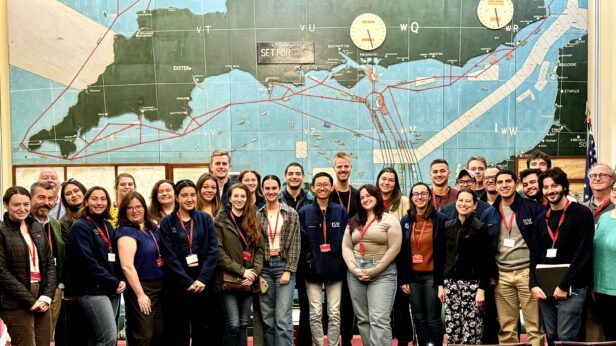
War Studies alumni have the opportunity to participate in advanced sessions. These sessions focus either on a national security challenge or on a historical conflict. Previous advanced seminars have focused on ISIS's ideology and vision and on the Eastern Front of World War II.

The Evans Hanson and War Studies Fellowships are designed to provide an opportunity for outstanding alumni of the War Studies Program to work as a research analyst at the Institute for the Study of War. The Fellowships seek to help build the next generation of national security leaders.
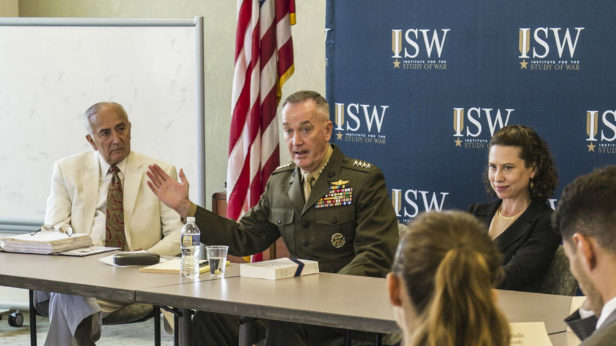
Alumni of the War Studies Program are also able to take advantage of internship and employment opportunities at ISW. Interns work directly with analysts and have many opportunities to engage with Institute leadership on the subjects of their research. Learn more about interning with ISW.

Darren Staloff
Darren Staloff is a retired Professor of History from the City College of New York and the Graduate Center of CUNY. Professor Staloff has published numerous papers and reviews on the subject of early American history.

Robert Barlett
Robert C. Bartlett is the Behrakis Professor of Hellenic Political Studies at Boston College. His principal area of research is classical political philosophy, with particular attention to the thinkers of ancient Hellas, including Thucydides, Plato, and Aristotle. He is the co-translator of a new edition of Aristotle’s Nicomachean Ethics.

Vickie Sullivan
Vickie Sullivan is the Cornelia M. Jackson Professor of Political Science and teaches and studies political thought and philosophy. She also maintains teaching and research interests in politics and literature. She has published extensively on Montesquieu and Machiavelli and is the co-editor of Shakespeare’s Political Pageant.

Daniel Blumenthal
Dan Blumenthal is a senior fellow at the American Enterprise Institute, where he focuses on East Asian security issues and Sino-American relations. Mr. Blumenthal has served in and advised the US government on China issues for more than a decade.

Aaron MacLean
Aaron MacLean is a senior fellow at Hudson Institute and the host of the School of War podcast. Previously, he was senior foreign policy advisor and legislative director to Senator Tom Cotton of Arkansas. Aaron served on active duty as a U.S. Marine for seven years, deploying to Afghanistan as an infantry officer in 2009–2010.
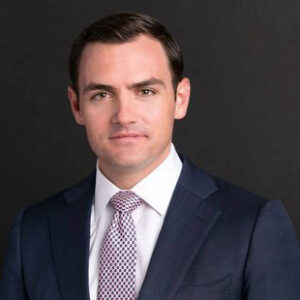
Mike Gallagher
Mike Gallagher served for four terms in the U.S. House of Representatives as Wisconsin’s 8th Congressional District representative. Previously, he served seven years on active duty in the U.S. Marine Corps, including two deployments to Iraq.
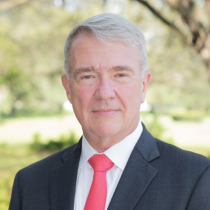
Gen. Kenneth F. McKenzie Jr.
Gen. Kenneth ‘Frank’ McKenzie Jr. is the former Commander of United States Central Command. He led a distinguished 42-year military career, commanding at multiple levels within the Marine Corps and serving on the Joint Staff. His leadership roles included commanding the First Battalion, Sixth Marines, and the 22nd MEU (SOC) during combat deployments to Afghanistan and Iraq.

Patrick Coleman
Patrick Coleman is a Tutor at St. John’s College. He earned his Ph.D. in Physics from University of Illinois, Urbana-Champaign, with a dissertation on synchronization, and his B.S. in Physics from William & Mary College along with a minor in Philosophy. He is currently leading a research group on the integration of a Technology and Computation segment in St. John’s College’s Graduate Institute. Patrick has led seminars and reading groups for The Catherine Project, including a recent reading group on Richard Feynman’s Lectures on Computation, and is especially devoted to deepening scientific literacy.

Daniel Blumenthal
Dan Blumenthal is a senior fellow at the American Enterprise Institute, where he focuses on East Asian security issues and Sino-American relations. Mr. Blumenthal has served in and advised the US government on China issues for more than a decade.

Christian Brose
Christian Brose is a Senior Fellow at the Carnegie Endowment for International Peace and the Head of Strategy at Anduril Industries, prior to which he served as staff director of the Senate Armed Services Committee. He was also responsible for leading the production, negotiation, and passage of four National Defense Authorization Acts, which set policy and authorized spending for all U.S. national defense activities.

Matthew Kroenig
Matthew Kroenig is a Professor in the Department of Government and the Edmund A. Walsh School of Foreign Service at Georgetown University. A 2019 study in Perspectives on Politics ranked him as one of the top 25 most-cited political scientists of his generation. He has served in several positions in the U.S. Department of Defense and the intelligence community in the Bush and Obama administrations.
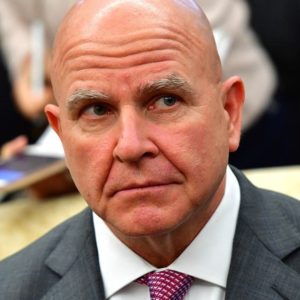
H.R. McMaster
H. R. McMaster is the Fouad and Michelle Ajami Senior Fellow at the Hoover Institution, Stanford University. Previously, he served as the 26th assistant to the president for National Security Affairs and as a commissioned officer in the United States Army for 34 years before retiring as a Lieutenant General. He is author of Battlegrounds: The Fight to Defend the Free World.
James M. Dubik
LTG James M. Dubik (U.S. Army, Ret.) is a Senior Fellow at the Institute for the Study of War and a Professor at Georgetown University’s Security Studies Program. General Dubik has extensive operational experience in Iraq, Afghanistan, Japan, Korea, Thailand, Bosnia, Haiti, Panama, and in many NATO countries.
Frederick W. Kagan
Frederick W. Kagan is a Senior Instructor with the Hertog War Studies Program at the Institute for the Study of War. The author of the 2007 report “Choosing Victory: A Plan for Success in Iraq,” he is one of the intellectual architects of the successful “surge” strategy in Iraq. He is the Director of AEI’s Critical Threats Project.
Kimberly Kagan
Kimberly Kagan is a Senior Instructor with the Hertog War Studies Program and founder and president of the Institute for the Study of War. She is a military historian who has taught at the U.S. Military Academy at West Point, Yale, Georgetown, and American University.